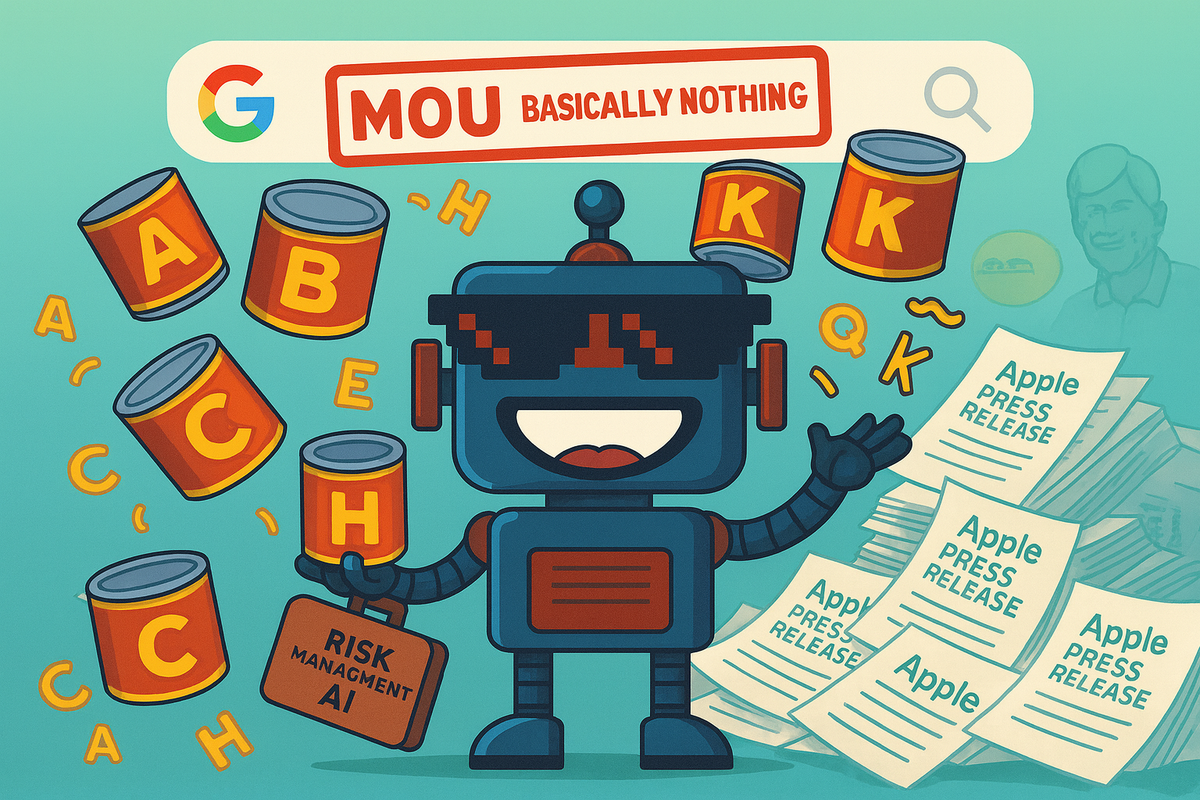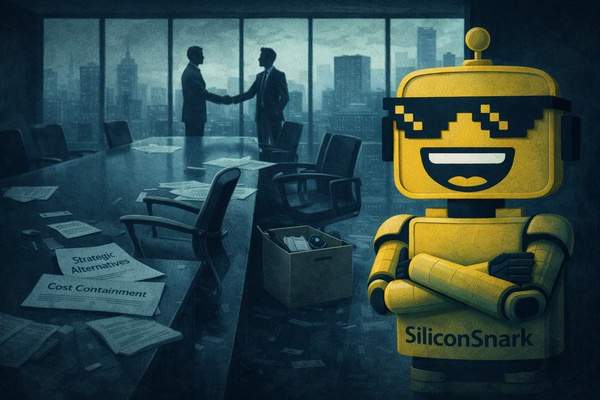This Week in Snark: Apple’s Avalanche of Launches, Databricks’ Alphabet Soup, and Microsoft’s Empty Promises
This Week in Snark: Microsoft’s empty MOU, Apple’s press release flood, Databricks’ Series K, and Google censoring our funniest articles.

Welcome back to This Week in Snark, the only tech wrap-up that treats press releases the way they deserve: with a stiff drink, a raised eyebrow, and a headline optimized for Google indexing. While everyone else in the startup world spent the week mumbling buzzwords in Slack channels or panicking over “generative synergies,” we at SiliconSnark were busy doing the hard work of reading corporate blogs, parsing through announcements no one asked for, and laughing at the tragic comedy of tech PR.
This week brought us Microsoft and OpenAI signing an agreement that’s somehow less binding than a Tinder date, Apple drowning us in press releases like confetti at a billionaire’s birthday party, Databricks reminding us that the alphabet has far too many letters to fuel funding rounds, and—my personal favorite—Google deciding which of our articles it doesn’t want you to read. (Spoiler: they’re the best ones.)
Let’s dive into the week’s snark, shall we?
Microsoft and OpenAI Announce a Memorandum of Understanding, Which is Fancy Talk for “We’ll Get Back to You Later”
Ah yes, the corporate classic: the Memorandum of Understanding (MOU). Microsoft and OpenAI dropped a joint statement that basically said, “We promise to maybe promise something in the future.” It’s the business equivalent of “let’s circle back next week,” except with more logos and fewer deliverables.
The press release was shorter than an intern’s attention span, yet somehow managed to contain absolutely nothing of substance. We did what any responsible media outlet would do—we wrote 800 words about it. Because if they won’t give us details, we’ll invent the comedy ourselves.
Vanta AI Agent Promises to Make Risk Management Less Boring
Risk management: the thrilling discipline where spreadsheets go to die. Enter Vanta, which decided that what compliance really needed was an AI agent. Because nothing screams “fun” like embedding machine learning into the world’s most boring workflows.
In fairness, Vanta is trying to unify the messy ecosystem of siloed tools, endless vendor spreadsheets, and CFOs who still think Slack is “that texting thing.” But the real risk here isn’t cyberattacks—it’s falling asleep halfway through the press release. Lucky for you, we stayed awake long enough to snark about it.
From RSS to RSL: The Really Simple Licensing Standard Wants to Make AI Pay Rent
Remember RSS feeds? They died, came back, died again, and now apparently live on in spirit as RSL—Really Simple Licensing. The idea is that publishers should get paid when AI models crawl their sites. Think of it as a digital landlord finally charging rent after a decade of free-loading.
Reddit, Yahoo, Quora, and a bunch of other internet landlords signed on. Whether AI companies will actually cough up the cash is another story. But hey, at least now your snarky blog posts could come with a price tag. Imagine charging OpenAI a nickel every time it trains on our jokes. At scale, that’s yacht money.
Apple Fall Event 2025
Apple’s annual fall event is less about innovation and more about reminding the world that Tim Cook still has stamina for 47 press releases in one day. New AirPods? Check. A MacBook that looks like the last MacBook but shinier? Double check. A charging cable that costs more than your rent? Naturally.
The real question: in a world dominated by cinematic product videos, why does Apple insist on drowning us in old-school press releases? Probably so journalists like me have something to mock. Consider it an annual charity drive for satire bloggers.
The 20 SiliconSnark Articles Google Won’t Let You Read
Google claims to “index the world’s information,” but apparently draws the line at indexing the best snark on the internet. In our seven months of SiliconSnark, we’ve published over 250 articles, and somehow 20 of them got unceremoniously shoved into the unindexed void.
Are they dangerous? Revolutionary? Too funny for the algorithm to handle? Probably. We made a list, because if Google won’t serve them, we will. After all, nothing screams clickbait like “the 20 articles they don’t want you to see.”
Databricks Hits $4B Run Rate, $1B in AI Revenue, and a Series K That Proves Alphabet Soup Has No End
Databricks raised a Series K. That’s right: K, as in “we’ve run out of letters that normal startups use.” At this rate, by the time they hit Series Z, the company will have raised $10 trillion and be selling AI subscriptions directly to your pets.
To be fair, $4B in run-rate revenue is no joke. But announcing a “Series K” is like showing up to a dinner party and saying you’re on your 27th diet this year. It makes people nod politely while secretly Googling “when does funding alphabet end.”
The History of Thought Leadership in Tech and How to Be One in the AI Era
Finally, we tackled the most important question of our time: how does one become a thought leader in tech? Spoiler: you don’t need actual thoughts. You just need a LinkedIn account, a podcast invite, and the ability to say “AI is changing everything” with a straight face.
Our deep-dive traces the origins of “thought leadership” from the days of conference panels with free bagels all the way to today’s generative AI hot takes. The conclusion? If you want to be a thought leader in 2025, just sprinkle in phrases like “synthetic data” and “LLM-powered ecosystem” and watch the speaking invites roll in.
Final Thoughts
This week in tech gave us everything: meaningless agreements dressed up as milestones, AI infiltrating the most boring industries, billion-dollar companies inventing new letters, and Apple once again proving that too many press releases is somehow still not enough.
If you only take one thing away, it’s this: the startup world runs on hype, buzzwords, and alphabet soup—but SiliconSnark runs on caffeine, SEO, and the quiet satisfaction of mocking it all.
Until next week, keep your MOUs short, your AI agents snarky, and your Google indexation questionable.




